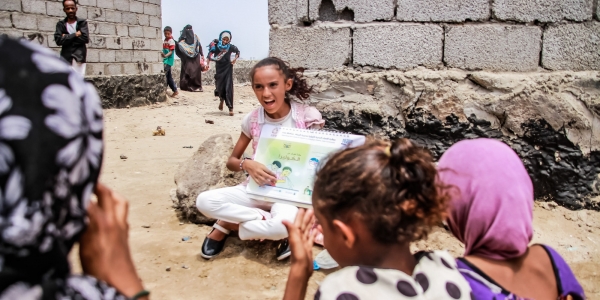
[ HOPE IN YEMEN: AMAAL’S STORY ]
War is hard for everybody, but it is infinitely harder on children. Their hopes and dreams are quite simple: a new toy, a cone of strawberry ice cream, playing outdoors or even going to school. But for millions of children across Yemen, these seem like impossible dreams. This is the case for Amaal, a ten-year-old Yemeni girl whose family, like thousands of others, had to flee their home in Hodeidah because of the war.
Amaal and her family finally settled in the Al Buraiqah district of Aden. They live in an old wooden house that they now call home, but they have no income and little hope.
“Our life is hard here but it’s better than watching my own children die in front of me,” says Amaal’s father Fahd, his eyes fixed to the ground in despair. “I am very sad I can’t send Amaal and her siblings to school. I just can’t afford it.”
Amaal’s heart was broken when schools opened and she knew she couldn’t join the other girls.
“I sit by our door and wait to see the girls walk home with their beautiful uniforms,” she says. “I know my father can’t afford it.”
But this didn’t stop the determined young Amaal. She still goes to the nearby mosque to join the Quran reciting lessons.
Amaal first saw CARE’s project team in Al Buraiqah last September, working on a project funded by the Crisis and Support Centre. CARE was providing internally displaced people (IDPs) with hygiene kits containing soap, laundry powder and other basic items; as well as conducting hygiene awareness sessions to educate people about how they can prevent diarrhea and stop the spread of cholera.
As CARE’s staff worked on the project, Amaal watched and then began to help them. First she helped the team to identify IDPs’ houses in the area, which gave her a chance to learn the hygiene messages. Then she started to copy the project team and began to teach other children the simple things she had learned, like how to wash their hands.
People really loved her, and this gave Amaal the hope and support she needed.
“Now I can speak to the other children without feeling ashamed of myself,” she says.
Everyone was impressed by Amaal’s strong will and the dedication they saw in a ten-year-old.
“I can’t wait now to go back home to my old school to finish my studies,” she says. “Because I want to be a doctor in the future and cure diseases.”
It is very fitting that Amaal’s name means ‘hope’ in Arabic.
Jennifer Bose: CARE Emergency Communications Officer